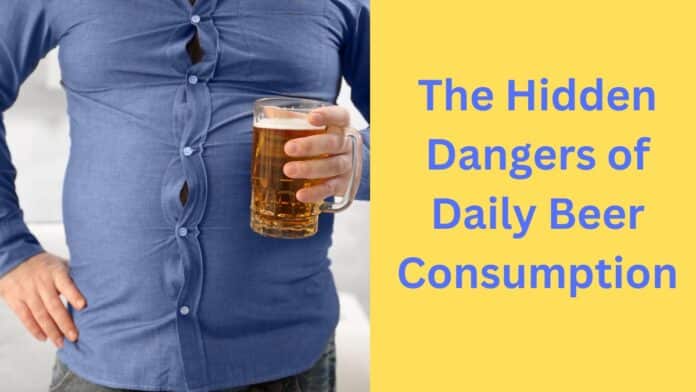Out of all alcoholic beverages, beer is the most relaxing and preferred beverage according to many. Cracking a beer can open feels relaxing to most people in the U.S. and a study says that around $109 billion in revenue was incurred by the beer-producing industry and about 68 liters of beer was consumed during the year by the people.
The alcohol by volume in beer is under 5% in many beers and hence they are being sold in grocery stores in states with strict liquor laws. It is the only easily available alcoholic beverage and so people tend to drink it more often. This can look simple and a much more suitable option for drinkers as the alcohol content is low but it should be noted that there are many major side-effects of beer when consumed on daily basis and it can be dangerous in long term.
Truth About Drinking Beer Daily
Drinking beer daily can have both short-term and long-term effects on your body.
Disturbance in Sleep Schedule

You may have heard people say or may have yourself experienced that beer makes you feel relaxed and gives you feelings of euphoria, and intoxication which can affect you in the future causing harm to your brain in long term.
It has also been observed and confirmed that alcohol affects your brain’s communication and reduces the brain’s ability to process information which can be dangerous. The National Institute on Alcohol Abuse and Alcoholism (NIAA) confirms the above information.
This further affects your sleeping and leads to other health issues due to sleep deprivation. Even a light amount of alcohol can affect sleep. A study published in 2018 compared the sleep quality of consumers of alcohol in different quantities which reflected that even light drinkers experienced a 9.3% decrease in sleep quality in both men and women. This is because the liver is geared up to metabolize alcohol which can make it difficult for the brain to rest leading to sleeplessness.
Weight Loss get Delayed

Consumption of liquor majorly affects metabolism as the liver prioritizes toxins first instead of food. This in turn affects the process of weight loss and fat burning as the liver is busy digesting alcohol.
“The liver’s job is to filter circulating blood and destroys toxic substances, including alcohol. The liver can handle a certain amount of alcohol, but as a person continues to drink, it can become stressed to the point of causing permanent damage,” said Gomer.
Leads to digestion issues:
Alcohol can also harm your intestine leading to problems with the gastrointestinal tract and the liver. It can negatively alter the bacteria in your gut and damage the lining of the intestine. All this leads to other major health problems like alcoholic fatty liver disease. It also leads to intestinal inflammation. All these problems are digestion problems which can prove to be fatal.
Cause of Dehydration:
Alcohol causes major internal acidic reactions in your body. Low-alcoholic beverages like beer can lead less water consumption. After consuming alcohol body doesn’t crave or have the capacity of demanding water whereas the water intake is reduced which leads to a hangover which is also type of dehydration.
“The alcohol in beer can result in dehydration. The kidney is responsible for regulating fluid and electrolytes, and alcohol can disrupt hormones that affect kidney function, which can affect the kidneys and the body’s ability to regulate fluid and electrolytes. It also disrupts hormones that affect kidney function,” said Gomer.
Nutrition information for beer
Before consuming anything the best practice you can inculcate is checking the contents and packaging details so as to ensure that it doesn’t prove harmful later. It is always better to consider anything before it takes a toll on your life.
According to the USDA, one 12-ounce can (355 mL) of regular beer contains:
- Calories: 153
- Protein: 2 g
- Total fat: 0 g
- Carbohydrates: 13 g
- Fiber: 0 g
- Sugars: 0 g
- Alcohol: 14 g
- Niacin: 2 mg
- Riboflavin: <1 mg
- Choline: 36 mg
- Folate: 21 mcg
- Magnesium: 21 mg
- Phosphorus: 50 mg
- Selenium: 2 mcg
- Vitamin B12: <1 mcg
Conclusion
It’s important to note that moderate beer consumption (defined as one drink per day for women and up to two drinks per day for men) is not generally associated with these negative health effects and may even have some health benefits. However, excessive beer consumption can have serious consequences for your health.

